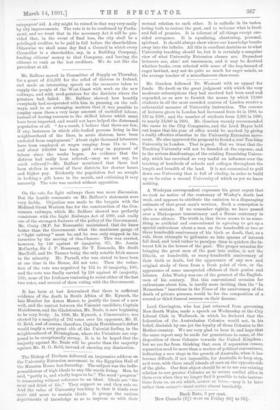A Wesleyan correspondent expresses his great regret that we took
no notice of the centenary of Wesley's death last week, and appears to attribute the omission to a disparaging estimate of that great man's services. Such a conception is quite a mistake. If we remember rightly, we have passed over a Shakespeare tercentenary and a Burns centenary in the same silence. The truth is, that there seems to us some- thing so artificial and conventional in agreeing to get up a special enthusiasm about a man on the hundredth or two or three hundredth anniversary of his birth or death, that, as a rule, these attempts to galvanise us into spasms of interest fall dead, and tend rather to paralyse than to quicken the in- terest felt in the heroes of the past. The proper occasion for bringing the great men of the past into notice, is not the fiftieth, or hundredth, or many-hundredth anniversary of their birth or death, but the appearance of any new and original study of them from a fresh point of view, or the appearance of some unexpected offshoot of their genius and labours. John Wesley was one of the greatest of the English- men of his century. But this conventional occasion for enthusiasm about him, is hardly more inviting than the "In. Memoriam" insertions in the Times of the anniversary of the death of private persons, would be for the composition of a second or third funeral sermon on their decease.


































 Previous page
Previous page